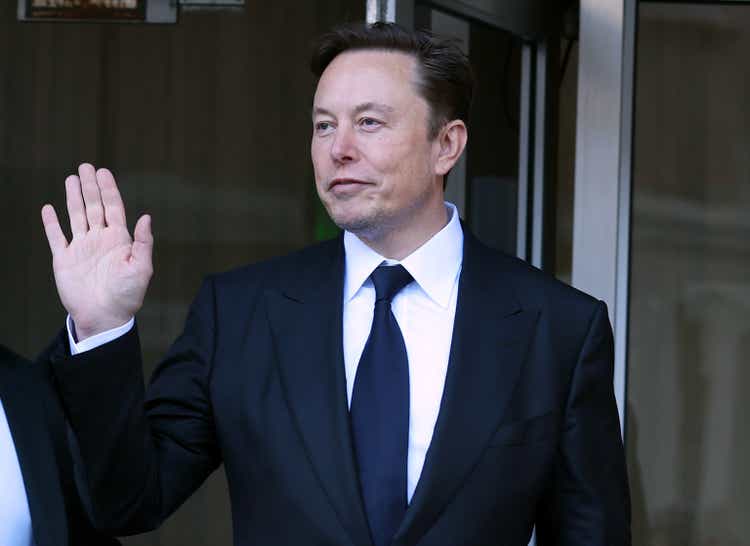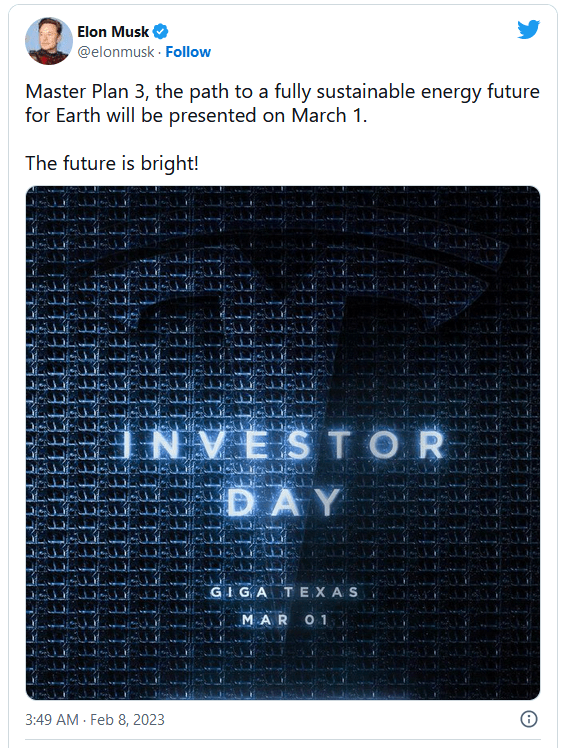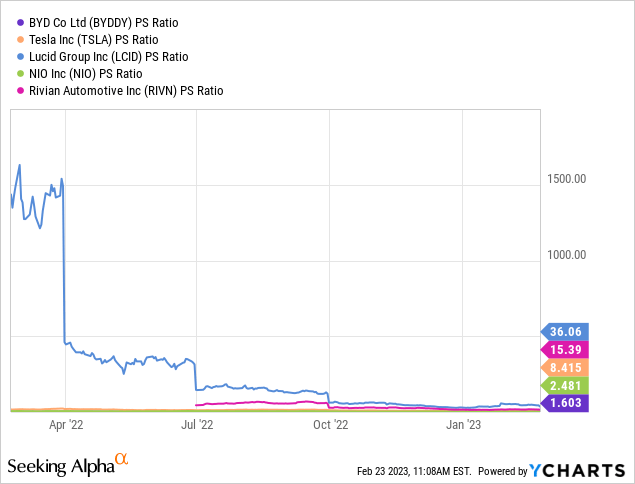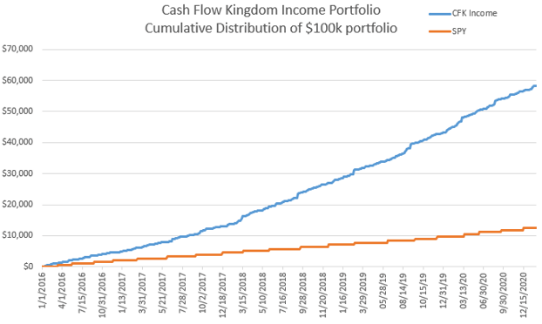Summary:
- Tesla will have its investor day on March 1. The company plans to release its Master Plan 3.
- This could impact some of Tesla’s competitors.
- We’ll take a look at what this might mean for Tesla, BYD, Lucid, and so on.

Justin Sullivan
Article Thesis
Tesla (TSLA) will have its investor day on March 1. While it’s not perfectly clear what exactly Tesla will be announcing and/or showing at that event, there are some items that could be of importance. We will look at potential news from the event and at how that could impact two of Tesla’s EV peers, BYD (OTCPK:BYDDY)(OTCPK:BYDDF) and Lucid (NASDAQ:LCID).
Tesla’s Investor Day
On March 1, Tesla will have its investor day. This is the first official investor day in the company’s history, and the company plans to unveil the “Master Plan 3.” Tesla’s past master plans included the introduction of new vehicles to access new market segments, and the plan generally was that profits from higher-priced models would fund the development for new models. That hasn’t really worked out as intended, as Tesla wasn’t profitable when it was only selling the S and the Roadster, thus the development of new models such as the 3 and Y was funded by the issuance of shares, not by the profits from the first models. Despite this past master plan not working as intended, Tesla still grew into a large and very profitable electric vehicle player, thus the overall company performance undoubtedly was strong.
Tesla’s past master plans, announced in 2006 and 2016, have also included some other items. Not all of these have been achieved. The 2016 plan, for example, included the achievement of what Tesla called “true self-driving”. Today, Tesla’s different self-driving techs, such as autopilot and FSD, offer Level 2 autonomous driving tech, according to how Tesla classifies the systems. Level 2 tech is available from many other auto companies as well, and it isn’t really “true self-driving.” Likewise, promises such as “1 million robotaxis,” “coast-to-coast summon,” and so on have not been met so far.
While Tesla has thus far from a perfect record when it comes to achieving the goals that the company announced in past master plans, the release of the next master plan a couple of days from now will still be an important item. It will showcase Tesla’s goals, strategy, and plans, even though it is not guaranteed that all of these goals will be met eventually.
Elon Musk has teased that the master plan would all be about sustainability and scaling the business:

While that can mean many things and might include some hyperbole, it’s likely that Tesla’s announcement of its master plan 3 will include a couple of themes. First, Tesla will likely announce some plans and goals for its energy business, i.e. its solar panel and battery storage franchises. Second, when Musk talks about Master Plan 3 being about scaling up the company, new model announcements could make sense. Tesla’s current model lineup is too expensive for many consumers, which will likely prevent Tesla from reaching the size of companies such as Volkswagen (OTCPK:VWAGY) or Toyota (TM) in terms of vehicles sold. To become a mass market player, Tesla will have to introduce lower-priced vehicles eventually. Musk first talked about a model that will be cheaper than the 3 in 2020, but we don’t know too much about the rumored “model 2” yet. It’s possible that Tesla will announce more specifics about this planned vehicle, which could be key in growing delivery numbers for the EV player. The update could also include announcements regarding Tesla’s Cybertruck (originally presented in 2019) or the Roadster 2 (originally planned for 2020).
The Impact Of Tesla’s Investor Day On BYD And Lucid
The investor day could impact shares of Tesla, of course, but it also could impact other EV players. While new announcements in areas such as solar panels or home battery systems likely won’t impact EV companies too much, new model announcements or similar items could have a large impact on BYD, Lucid, NIO (NIO), Rivian (RIVN), and so on.
BYD is, depending on whether one includes plug-in hybrid vehicles, the largest or second-largest EV company in the world in terms of deliveries. It also has been growing way faster than Tesla over the last year when BYD’s deliveries exploded upwards by more than 100%. BYD’s vehicles have considerably lower average prices than those sold by Tesla, however, which is why its sales aren’t as high as those of its American peer. With BYD’s strong presence in the entry-level or affordable EV market, it’s pretty clear that the announcement or introduction of a new, cheap Tesla vehicle could impact BYD significantly. While I do not believe that this would hit BYD’s sales performance in the near term, since there likely would be a considerable time lag until a model 2 actually comes to the market, even before accounting for the typical delays at Tesla. But if Tesla decides to enter the lower-priced EV segment in force over the next couple of years, this could eventually impact companies such as BYD considerably. It might reduce their sales potential, although the overall growth of the market should still allow for deliveries growth for BYD and others – but BYD’s growth would likely be lower compared to a scenario where Tesla continues to focus on higher-priced EVs. If Tesla were to enter the lower-priced EV market in force, it’s also possible that margins for the whole industry come under pressure, as increasing competition in the automobile industry has a tendency of pressuring margins for all players. That might mean that BYD’s margins could come under pressure, but it also suggests that Tesla’s margins could decline if it enters cheaper, less profitable market segments. BYD is not only a competitor to Tesla, its also a supplier, as Tesla uses BYD’s batteries for some of its vehicles. If Tesla starts to chase growth in lower-priced market segments, its demand for batteries would likely grow: This, in turn, could be positive for battery suppliers, including BYD.
Tesla’s Master Plan 3 also could impact luxury EV players such as Lucid in several potential ways. If Tesla were to announce a focus on cheaper EVs, that could impact its brand image in the future, as Tesla might be seen as more of a mass market player like VW or Toyota if it were to expand substantially in lower-price segments. In that case, its premium appeal might wane. A premium/luxury EV player such as Lucid could benefit from that, as buyers that want a premium or luxury vehicle might be discouraged from buying a more mass market-focused Tesla, instead opting for vehicles from higher-end brands such as Lucid. If Tesla moves down in terms of market segments over time, the players that are positioned above Tesla might have more room for themselves. Of course, the contrary could be true as well. If Tesla announces meaningful news about its Roadster 2 or if it were to unveil a new high-end vehicle, Lucid might be negatively impacted by increased competition. Lucid is seen, by some, as a technological leader when it comes to the actual physical performance of its vehicles (although there are some software issues, etc. according to some vehicle owners). If Tesla were to announce a breakthrough in areas such as performance, charging speed, battery tech, and so on, Tesla might regain its status as a tech leader, which could negatively impact Lucid in two ways. First, it might make LCID’s vehicles less appealing, and second, it might make Lucid’s stock less appealing, as some investors might move away from LCID if it loses its tech leader status.
Which EV Players Are Attractive?
Among the companies shown in this article, I believe that BYD is the most attractive one overall. It’s active in many different markets (battery production, passenger EVs, commercial EVs), it showcases rapid growth, and it’s trading at a pretty low valuation relative to how other EV players are valued:

BYD trades at just 1.6x trailing sales, around one-fifth of the valuation Tesla trades at. NIO is in between these companies, being valued at around 2.5x trailing revenues. American peers Lucid and Rivian (which could be impacted by news about Tesla’s Cybertruck at the investor day event) are way more expensive, being valued at 15x and 36x trailing revenue, respectively.
Tesla has seen its shares bounce massively from the lows that were hit a couple of weeks ago, and it is now rather pricey again, I believe. Lucid, meanwhile, is pretty expensive, and it has to showcase its ability in ramping up production. At the same time, speculation about a potential takeover bid from Saudi Arabia’s sovereign wealth fund has been responsible for volatile trading when it comes to LCID’s stock.
Takeaway
The announcement of Tesla’s Master Plan 3 will be of interest for TSLA owners, of course, but depending on what Tesla announces, other companies might be impacted as well. BYD could benefit from higher battery demand if Tesla plans to scale up its production, but at the same time, BYD might see increasing competition when Tesla introduces a lower-priced car. Depending on what Tesla announces, a pureplay premium manufacturer such as Lucid could be impacted positively (if Tesla moves down toward the mass market) or negatively (if new high-end vehicles are introduced).
Investing in EV companies always goes hand in hand with major uncertainties – the industry is prone to disruption and is capital intense, margins are low, and there is a lot of competition. That being said, BYD looks like the best in the group to me at current prices, thanks to a low valuation, massive scale, and extraordinary growth.
Editor’s Note: This article discusses one or more securities that do not trade on a major U.S. exchange. Please be aware of the risks associated with these stocks.
Disclosure: I/we have a beneficial long position in the shares of BYDDY either through stock ownership, options, or other derivatives. I wrote this article myself, and it expresses my own opinions. I am not receiving compensation for it (other than from Seeking Alpha). I have no business relationship with any company whose stock is mentioned in this article.
Is This an Income Stream Which Induces Fear?
 The primary goal of the Cash Flow Kingdom Income Portfolio is to produce an overall yield in the 7% – 10% range. We accomplish this by combining several different income streams to form an attractive, steady portfolio payout. The portfolio’s price can fluctuate, but the income stream remains consistent. Start your free two-week trial today!
The primary goal of the Cash Flow Kingdom Income Portfolio is to produce an overall yield in the 7% – 10% range. We accomplish this by combining several different income streams to form an attractive, steady portfolio payout. The portfolio’s price can fluctuate, but the income stream remains consistent. Start your free two-week trial today!
